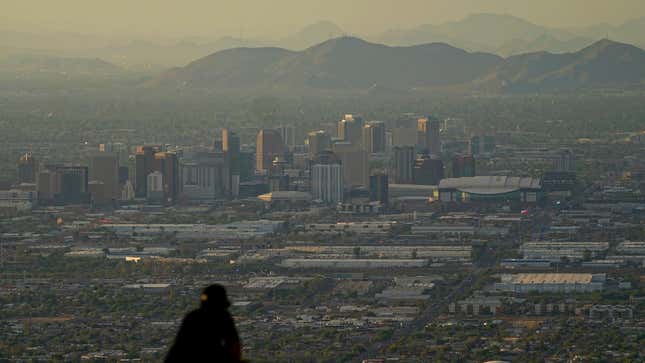
If you live anywhere in the U.S., July was probably a very hot month for you. Here in Georgia, most days saw highs in the 90s with an obnoxious amount of humidity pushing the heat index past 100, making it miserable to do anything outside. And yet, Phoenix, Arizona’s July made those temperatures look moderate and tolerable in comparison. According to a recent report by Reuters, Phoenix had 30 days in a row where temperatures were above 110.
That’s not just hot. It’s ridiculously hot. So hot that if you touch the asphalt even for only a few seconds, you could easily burn yourself. That’s because concrete and asphalt in direct sunlight continue to absorb heat, getting up to temperatures of 180 Fahrenheit even when air temperatures are still not immediately-burn-yourself hot. On a 100-degree day, asphalt temperatures could be pushing 150. A patch of grass, on the other hand, would only be a few degrees warmer than the air.
That creates a problem in urban areas where you end up with what is known as urban heat islands. With so many buildings, roads and parking lots but very few green spaces, the Environmental Protection Agency says the annual average air temperature in cities with at least a million people is between 1.8 and 5.4 degrees warmer than in nearby rural areas. At night, though, that difference grows even more drastic because cities trap heat and release it much more slowly than in rural areas.
Since most people live in urban areas, that’s not a good thing. But it’s also a problem that can be improved. Planting trees and adding parks helps. Cities just have to actually commit to doing better, even if the green spaces they add aren’t anywhere as big as New York’s Central Park. For example, planners in Athens, Greece are taking smaller pieces of land and turning them into so-called “pocket parks” to help cool down the city. “It’s about creating green spaces, lowering the temperatures, giving quality of life and creating new reference points inside the city,” Athens Mayor Kostas Bakoyannis told Reuters.
The entire Reuters article is a fantastic read with much more information than we can summarize here (as well as some pretty graphics), so be sure to head over there to read the rest.

